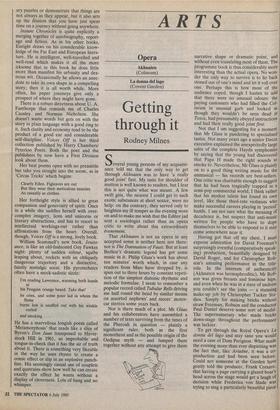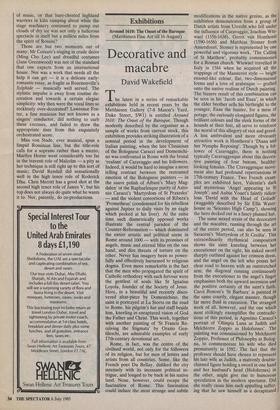ARTS
Opera
La donna del lago (Covent Garden)
Getting through it
Rodney Mimes
Several young persons of my acquaint- ance told me that the only way to get through Akhnaten was to have 'a really good joint' first. My taste for shoulder of mutton is well known to readers, but I fear this is not quite what was meant. A few swift gins, the nearest I could get to such exotic substances at short notice, were no help: on the contrary, they served only to heighten my ill temper as the evening wore on and to make me wish that the Editor jad sent a sociologist rather than an opera critic to write about this extraordinary evenement.
That Akhnaten is not an opera in any accepted sense is neither here nor there: nor is The Damnation of Faust. But at least Berlioz's dramatic legend has got some music in it. Philip Glass's work has about ten minutes' worth which, in case any readers from Mars have dropped by, is spun out to three hours by constant repeti- tion of the simplest diatonic rhythmic and melodic formulae. I seem to remember a popular record called Tubular Bells driving me half round the bend by similar means on assorted nephews' and nieces' motor- car stereos some years back.
Nor is there much of a plot. Mr Glass and his collaborators have assembled a number of texts surviving from the times of the Pharoah in question — plainly a significant ruler, both as the first monotheist and as the possible origin of the Oedipus myth — and lumped them together without any attempt to give them
narrative shape or dramatic point, and without even translating most of them. The programme book is thus considerably more interesting than the actual opera. No won- der the only way to survive is to lie back stoned out of one's mind and let it roll over one. Perhaps this is how most of the audience coped, though I hasten to add that there were no unusual odours: the paying customers who had filled the Col- iseum in unusual garb and looked as though they wouldn't be seen dead at Tosca, had presumably obeyed instructions and had their really good joint first.
Not that I am suggesting for a moment that Mr Glass is pandering to specialised tastes. Not many years ago a senior Decca executive explained the unexpectedly large sales of the complete Haydn symphonies by saying that the young had discovered that Papa H made the right sounds to smoke to. Nevertheless, Mr Glass is plainly on to a good thing writing music for the unmusical — his records are best-sellers. One critic was charitable enough to suggest that he had been tragically trapped in a semi-pop commercial world; I think rather that his modest talent has found its own level, like those third-rate violinists who make successful careers playing in 'period' barids. I am not sure what the meaning of decadence is, but suspect that anti-music written for people who have to dope themselves to be able to respond to it may come somewhere near it.
Having got that off my chest, I must express admiration for David Freeman's surprisingly eventful (comparatively speak- ing) production, beautifully designed by David Roger, and for Christopher Rob son's amazing performance in the title role. In the interests of authenticity (Akhnaten was hermaphroditic), Mr Rob- son was given breasts and feminine hips, and even when he was in a state of undress you couldn't see the joins — a stunning make-up job by Christopher Tucker Stu- dios. Simply for making bricks without straw Freeman, Robson and the conductor Paul Daniel deserve some sort of medal. The supernumerary who made bricks down-stage throughout the performance was luckier.
To get through the Royal Opera's La donna del lago and stay sane you would need a case of Dom Perignon. What made the evening more than ever dispiriting was the fact that, like Ariadne, it was a co- production and had been seen before. Could not someone at the Garden have gently told the producer, Frank Corsaro, that having a page carrying a glazed boar's head across the stage would get a laugh of derision while Frederica von Stade was trying to sing a particularly beautiful piece of music, or that bare-chested highland warriors in kilts camping about while the stage machinery continued to pump out clouds of dry ice was not only a ludicrous spectacle in itself but a million miles from the spirit of Rossini?
Those are but two moments out of many; Mr Corsaro's staging in crude decor (Ming Cho Lee) and dreadful costumes (Jane Greenwood) was not of the standard that one expects from an international house. Nor was a work that needs all the help it can get — it is a delicate early- romantic essay, as fragile as Boumonville's Sylphide — musically well served. The stylistic impulse is away from routine de- coration and towards a certain elegiac simplicity: why then were the vocal lines so recklessly over-decorated? Lawrence Fos- ter, a fine musician but not known as a singers' conductor, did nothing to curb these excesses, and failed to draw the appropriate tinta from this exquisitely orchestrated score.
Miss von Stade, ever musical, spun a limpid Rossinian line, but the title-role calls for a soprano rather than a mezzo; Marilyn Home went considerably too far in the travesti role of Malcolm — a pity as her technique is still right up to this sort of music; David Rendall did sensationally well in the high tenor role of Roderick Dhu. Chris Merritt has a good shot at the second high tenor role of James V, but his top does not always do quite what he wants it to. Nor, patently, do co-productions.



















































 Previous page
Previous page